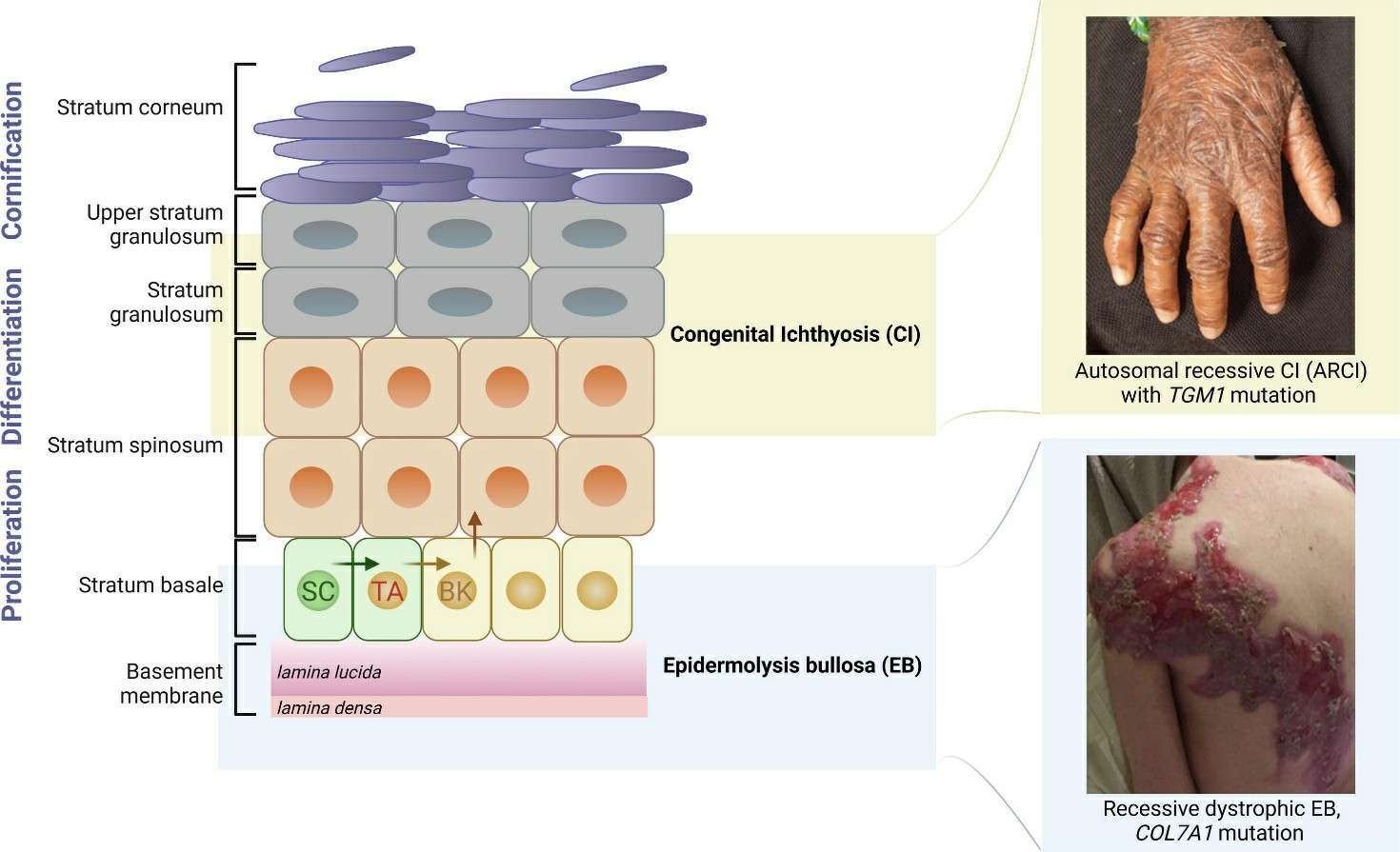Genetic Skin Diseases are a diverse group of debilitating disorders caused by inheritable genetic mutations. While individually uncommon, these conditions collectively impact millions globally, presenting significant healthcare challenges. At our company, we are dedicated to advancing research and developing transformative therapies to address the unmet needs of those affected by Genetic Skin Diseases.
Introduction to Genetic Skin Diseases
Genetic Skin Diseases are a diverse and debilitating group of disorders caused by inheritable genetic mutations, collectively impacting millions worldwide. Characterized by a wide range of severe symptoms that can affect the skin's structure, function and integrity, these conditions present significant challenges for patients and healthcare providers alike.
Pathogenesis of Genetic Skin Diseases
The pathogenesis of Genetic Skin Diseases often involves mutations in genes responsible for skin structure and function, leading to defects in keratinocyte differentiation, adhesion, or signaling pathways. These genetic alterations can disrupt the skin barrier, cause abnormal cell proliferation, or impair immune responses, resulting in symptoms like blistering, scaling, or abnormal pigmentation.

Fig.1 Skin structure and genodermatoses. (Pinon Hofbauer, J.,
et al., 2024)
Recent research highlights the role of epigenetic modifications and microRNAs in modulating these pathways, offering potential targets for therapeutic intervention. Advances in genomic technologies continue to enhance our understanding of these complex diseases, paving the way for personalized treatment approaches.
Therapeutics Development for Genetic Skin Diseases
The development of therapeutic strategies for Genetic Skin Diseases has seen significant progress, particularly in regenerative medicine and gene-based therapies. For conditions like epidermolysis bullosa (EB), several approaches are in various stages of development, including cell-based therapies, gene therapy, and protein replacement therapy.
Table.1 Generalized approaches of regenerative medicine for epidermolysis bullosa at different stages of development. (Uitto, J., 2012)
| Therapeutics |
Development Stage |
| Cell-based therapies |
|
| Fibroblast therapy for RDEB |
clinical trial stage |
| Mesenchymal stem cell application |
clinical trial stage |
| Bone marrow transplantation |
clinical trial stage |
| Induced pluripotent stem cells |
preclinical development |
| Gene therapy |
|
| Ex vivo keratinocyte therapy |
clinical trial stage |
| Direct gene application (gene gun) |
preclinical development |
Genome repair, trans-splicing,
PTC read-through |
preclinical development |
| Gene silencing (siRNA) |
preclinical development |
| Protein replacement therapy |
|
| Type VII collagen (RDEB) |
preclinical development |
| Laminin 332 (JEB) |
preclinical development |
Disclaimer: Protheragen focuses on providing preclinical research services. This table is for information exchange purposes only. This table is not a treatment plan recommendation. For guidance on treatment options, please visit a regular hospital.
Our Services
We offer a full range of services to advance therapies for Genetic Skin Diseases. Our team of expert scientists, dermatologists, and geneticists applies cutting-edge technologies to drive progress, with focused therapeutic development and disease model development services to support your projects.
Types of Genetic Skin Diseases
Drawing on our deep expertise, we are committed to supporting the research and development of treatments for a wide range of Genetic Skin Diseases. Each condition presents unique genetic characteristics and pathological mechanisms, and our team understands these differences in detail. We provide tailored solutions for each type of rare genetic skin disease, accelerating the discovery and application of effective therapies.
At our company, we specialize in one-stop preclinical development services dedicated to advancing therapeutics for rare skin diseases. Our end-to-end solutions streamline the drug development process, from target discovery and disease modeling to in-depth drug safety evaluation services and drug metabolism and pharmacokinetics.
If you are interested in our services, please don't hesitate to contact us.
References
- Pinon Hofbauer, J., et al. "Challenges and Progress Related to Gene Editing in Rare Skin Diseases." Adv Drug Deliv Rev 208 (2024): 115294.
- Uitto, J. "Rare Heritable Skin Diseases: Targets for Regenerative Medicine." J Invest Dermatol 132.11 (2012): 2485-8.
All of our services and products are intended for preclinical research use
only and cannot be used to diagnose, treat or manage patients.


 Fig.1 Skin structure and genodermatoses. (Pinon Hofbauer, J., et al., 2024)
Fig.1 Skin structure and genodermatoses. (Pinon Hofbauer, J., et al., 2024)
